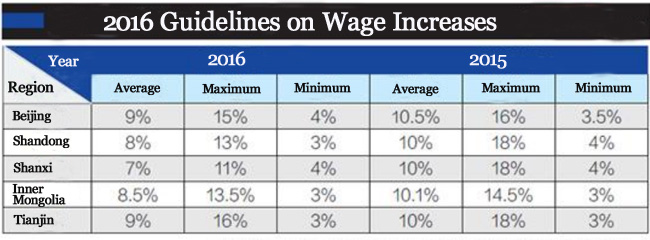Smaller wage increases flagged this year
Updated: 2016-07-26 15:38
By Wu Yan(chinadaily.com.cn)
|
||||||||
 |
|
Notes: Average represents average suggested wage increase |
Five municipalities and provinces have issued their 2016 guidelines on wage increases, heralding a smaller wage increase this year as most wage growth rates fall, China Economic Weekly reports.
The newspaper, a subsidiary of People's Daily, reports that as of July, municipal governments in Beijing, Tianjin and the provincial governments in Shandong, Shanxi and the Inner Mongolia autonomous region have laid out the suggested wage increase levels for enterprises based on regional GDP, labor markets, and other socioeconomic conditions.
Guidelines on wage increases, introduced in 1997 in China, can be divided into three levels: average suggested wage increase, maximum suggested wage increase and minimum suggested wage increase.
Data shows that the average suggested wage increase of five regions all dropped to below 10 percent, with Shanxi having the biggest decline of 3 percent.
The maximum suggested wage increase fell noticeably. Shandong dropped to 13 percent from 18 percent last year and Shanxi goes down to 11 percent from last year's 18 percent.
Unlike average and maximum suggested wage increases, the minimum suggested wage increase adjusts according to different regions. Beijing increased 0.5 percent to 4 percent, Shandong edged down to 3 percent from 4 percent last year and others stayed the same.
Su Hainan, vice president of the China Association for Labor Studies, said as China's economy faced a downward pressure, the growth of wages should be in accordance with economic growth.
Guidelines on wage increase are "based on a region's GDP, price rising level, labor productivity and overall wage level of last year", said Su, adding that it was not compulsory for an employer to increase wages according to the guidelines.
The guidelines are usually released in the first half of the year. Su said that some regions not giving their guidelines may be related to their own economic performance. A case in point is Northeast China's Heilongjiang province. Battered by its softening economy, Heilongjiang has not released its guidelines for several years
"If maximum suggested wage increase sets too high, employees will feel hard to pay labor cost, impairing their competitiveness in the market. If minimum suggested wage increase is low, employers' life will be affected by the rising goods prices", Su said.
- S. Korea to launch WWII 'comfort women' victims foundation
- China to become Australia's biggest tourist source market
- Patient shoots, kills doctor in Berlin then kills himself
- One of church attackers tried to join IS in Syria
- China's coal usage may peak by 2020, experts say
- Bavarian bomber pledged allegiance to Islamic State

 In pictures: Aerial images of Rio's Olympic venues
In pictures: Aerial images of Rio's Olympic venues
 Images reveal distinctive Tunpu culture in Guizhou
Images reveal distinctive Tunpu culture in Guizhou
 Ten photos from around China: July 22 – 28
Ten photos from around China: July 22 – 28
 Welcome back, daddy!
Welcome back, daddy!
 Sweat, hard work and pain: Life of model
Sweat, hard work and pain: Life of model
 Top 10 most profitable companies in the world
Top 10 most profitable companies in the world
 Exhibition showcases Chinese artworks in London
Exhibition showcases Chinese artworks in London
 In pics: Cool ways to beat the heat wave
In pics: Cool ways to beat the heat wave
Most Viewed
Editor's Picks

|

|

|

|

|

|
Today's Top News
Ministry slams US-Korean THAAD deployment
Two police officers shot at protest in Dallas
Abe's blame game reveals his policies failing to get results
Ending wildlife trafficking must be policy priority in Asia
Effects of supply-side reform take time to be seen
Chinese State Councilor Yang Jiechi to meet Kerry
Chinese stocks surge on back of MSCI rumors
Liang avoids jail in shooting death
US Weekly

|

|







